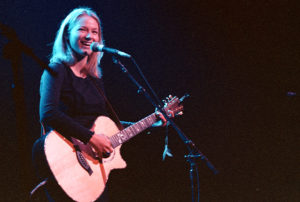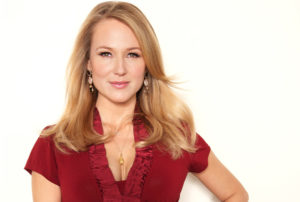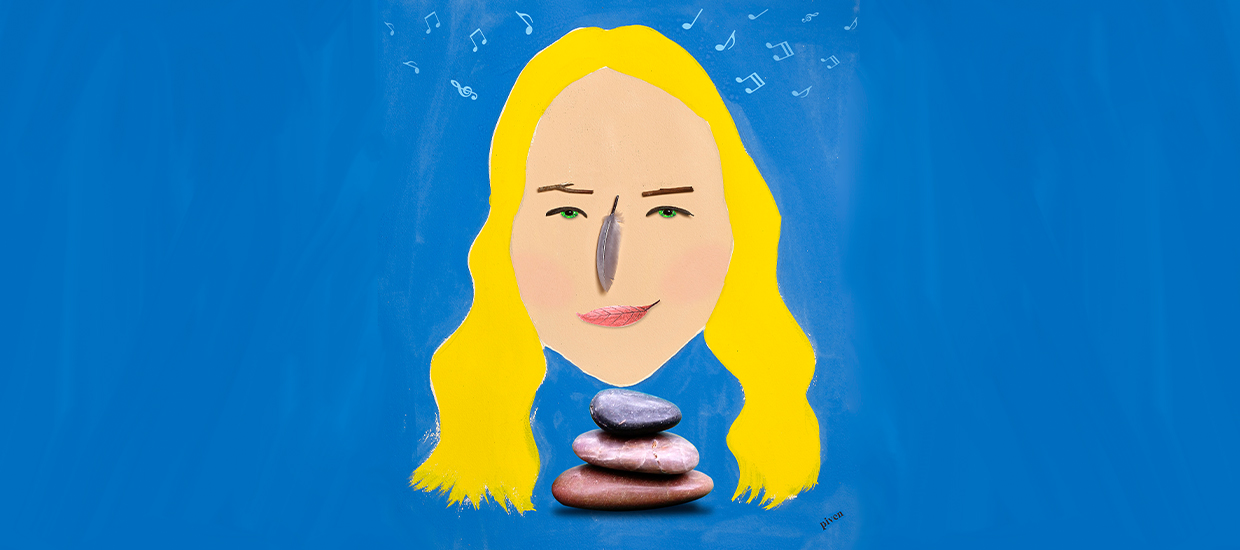With the release of her 13th album, the folk superstar shares how mindfulness and gratitude have helped her find peace
Jewel’s life story would make a wild docudrama. Born in 1974 and raised on an Alaska homestead, she sang in bars with her father as part of a yodeling duo before moving out on her own, at 15, into a tiny cabin with no plumbing, in a location so remote that she had to ride a horse two hours to get to her odd jobs in town. Her teen years would find her hitchhiking through Mexico, where she stared up at the stars and wrote her first song, “Who Will Save Your Soul.” By her late teens she was homeless, living in her car—and then major-label record execs discovered her at a beachside San Diego coffee shop, where she played the gentle but biting acoustic folk-pop songs, like “Foolish Games” and “You Were Meant for Me,” that would make her a multiplatinum artist synonymous with ’90s angst.
Jewel’s goal, she has said, has always been to be a person first and an artist second, and in recent years that has meant focusing on her Inspiring Children Foundation and her program for struggling youth, Never Broken. But this fall, her music puts her back in the spotlight, as she releases her 13th album, the soulful Freewheelin’ Woman. She’s also hard at work on her next book, which will be about mindfulness and the “tools that help rewire us.” Calling from her longtime home in Colorado, Jewel, now 47, is as articulate and forthright as one might expect of a woman who once wrote of her quest to “use reason and my mind to change my internal landscape.”
Has anyone tried to make a biopic based on your life? The story you tell in your 2015 memoir, Never Broken, is remarkable.
Not yet!
Someone needs to. When you were 16, the residents of your small Alaska town came together to help raise the money you needed to attend the prestigious Interlochen Arts Academy in Michigan. What did that teach you about people?
I think it was really significant that it was women who took me under their wing, who said, “No, this is doable. This is possible. You can get $10,000 together.” They all pitched in and cared when they certainly didn’t have to. It really does show you what a community can do. It changed the trajectory of my life.
You wrote in Never Broken that when you arrived in Michigan, you might as well have been on Mars. What shocked you about mainstream American culture?
It was what you would call pop culture. I wrote a lot about it. “Who Will Save Your Soul” was the first song I wrote, and it was all about pop culture: Why are we starting to outsource our salvation? Why do we believe that people on TV are better than us?

So many of your early songs contain critiques of power and society, sexism and homophobia, the media and corporate greed. What contributed to your sense of skepticism about the world?
It was a combination of things. I read a lot of philosophy, and that definitely affected my writing style. From a young age, I was examining the underpinnings of what motivates action, what motivates thought—and whose thoughts are we thinking? I think it was also from being raised in barrooms. I was raised with a hard slice of life. I saw life without the varnish. I saw drunks and drug addicts. I saw desperation and hurt, and people not being taught what to do with hurt. And I knew I was in pain, and what do I do with pain? That all culminated in how I wrote.
Was there a particular philosopher who changed the way you thought?
Oh my gosh, everybody. When I learned about the dialectic—the idea that you can debate and a third idea will come—it was like looking at magic. I thought, Wait a minute. If two people talk, a brand new idea could get birthed? It was very empowering for me, as somebody who was scared and felt disempowered. As was the idea that you could engage in dialectic inside yourself. When I realized I could ask myself a question, and somewhere inside I’d hear an answer, that was like alchemy, magical s***.
What kind of questions?
Why is it this way? What makes us this way? What makes me this way? And I had a very specific goal: to try and save myself. I wondered, if my nurture was bad, would I ever get to know my real nature? Or was I screwed at 15? If abuse was passed on generation to generation, and I was raised speaking this emotional language, could I learn a new one? I hoped that through dialectic, through questions, through observation, through curiosity, I could find my way out of being a statistic and into rewiring myself and discovering my nature beneath my nurture.
That’s so powerful. Is there a specific question that you pose to yourself these days?
Definitely. I love self-growth. I go within a lot. I spend about an hour meditating every day and discovering things about myself. I like patterns. And I’m quite interested in where culture is at. Thinking about the ’90s and the questions that got raised, us saying, “Hey, we don’t feel good. We want to feel like we’re part of something, but we belong to nothing”—that angst and disillusionment. How did that culminate in Woodstock 99, for instance, and women being sexually abused at that festival? Those men went into the workplace and grew up to be the [ones exposed by] the #MeToo generation. That’s what it looks like to me. We’re still trying to figure out, what do we belong to? How do we become effective and reach a critical mass? I’ve been writing a lot about that.
Your new album is called Freewheelin’ Woman. Is that an intentional nod to The Freewheelin’ Bob Dylan, from 1963? Dylan was one of your early mentors.
It’s a line out of one of the songs on my album, and I felt like it summed up where I am. I’ve been fortunate, as a woman, to move about the world and my life with some autonomy—getting to make my own decisions and do things on my own terms. I felt like the title was really appropriate. It wasn’t until after I titled it that someone mentioned Bob Dylan, which is perfectly fitting and welcome.
It made me wonder, what advice did Dylan give you in the ’90s?
The thing that was most important to me was that he really believed in me. He liked my art, and nobody did at the time. The press was calling me a mistake, a Pollyanna, naive, dumb. My music wasn’t going anywhere. And the fact that Dylan liked me… I remember thinking, Well, if no one else does, that’s fine! It was very validating and very rewarding to have someone you think of as a hero ask, “Why did you write this lyric? What were you thinking about during this lyric? What are you reading right now?” He’d give me books to read, music to listen to. He liked that I was solo acoustic. He was like, “Just keep going.” It definitely invigorated me.
What books did he give you?
I was reading Proust at the time, and he gave me one of his favorites. I remember him telling me he learned French to read Proust, and I was like, Of course you did. You’re Bob Dylan.
You wrote the song “No More Tears” for a documentary that you executive-produced about youth homelessness. How does it relate to your own experience?
When you feel badly—if you’re having suicidal ideation, if your life is gripped in misery—it’s so hard to believe that there is another side, that there’s something beyond the tunnel you’re in. People become so gripped in the finality of that feeling and the eternity of that feeling that they take their own lives. “No More Tears” is a love song to humans, a love song to people suffering, to tell them to keep fighting, to keep insisting that happiness is your birthright and to not give up—to not settle until you figure out how to be happy.

Does the song “Grateful” relate to your mindfulness practice?
Yes. On my website JewelNeverBroken.com, one of the things I teach is a gratefulness practice. The reason it works is because there are only two basic states of being: dilated and contracted. Every single thought, feeling, or action you have during the day leads your body into one of those two states. When we’re anxious, jealous, petty, overwhelmed, sleep-deprived, our body contracts. When we’re curious, observant, walking in nature, connecting to loved ones, our body dilates. It’s vascular. I realized while I was homeless that I could find my way out of panic attacks by deeply engaging in gratitude. That’s basically what the song is about—even though it sounds like Bill Withers.
Do you remember what you were grateful for during those times?
The first time I got it to work, I was feeling quite sorry for myself, and I felt a panic attack coming on. I looked up and saw the sunlight coming through the trees like lace. It reminded me of all the times as a little girl in Alaska that I watched the sunlight through the dappled trees, and I suddenly just became moved to tears that I was alive. My whole body became overwhelmed with this feeling of gratitude in the warmth of the sun. It was very simple. And that’s why the song “Grateful” mentions a lot of little things. I was homeless, but that didn’t mean I couldn’t have happiness; that didn’t mean I couldn’t figure out how to experience connection. It didn’t mean I couldn’t figure out how to be the master of my own mind and my own well-being, no matter the circumstances. It really taught me that when you engage gratitude fully, your whole body will dilate. It lowers your blood pressure, changes the blood flow patterns in your brain, changes your neurochemical flow. It’s insane. It’s such a simple thing, with such a profound effect.
I recently learned that Lana Del Rey had a line from your song “Angel Standing By” as her high school yearbook quote. How did it feel to learn that?
You never know what your music’s going to do. It’s been amazing to see the women who have been inspired by my music. Taylor Swift said she listened to my first album over and over. One of my favorites was Lena Dunham saying she grew up reading my poetry. That’s so neat.
A couple of weeks ago I was having a panic attack, and my roommate started playing “You Were Meant for Me” on an acoustic guitar. It was so calming. Have people always told you that your music has that effect on them?
Yes, and I don’t know what it is. I could get into theories of quantum signatures going into soundwaves, but there’s something about music where, for the person singing it, all of our lived experiences somehow get communicated through tone and timbre. I don’t know how it works, but it does. The reason I made my 2009 album Lullaby was because I wrote myself lullabies to get myself out of panic attacks my whole life, starting when I was about 16. But other people were telling me that they were getting themselves out of panic attacks using my first album. It’s funny to me, because on Pieces of You there’s some dark material, like “Daddy.” But for some reason, the overall arc soothes people [laughs]. College students, people with panic disorders, and mothers with infants will listen to that record to soothe themselves.
Next Up: Loretta Lynn on her Timeless Friendship with Patsy Cline
